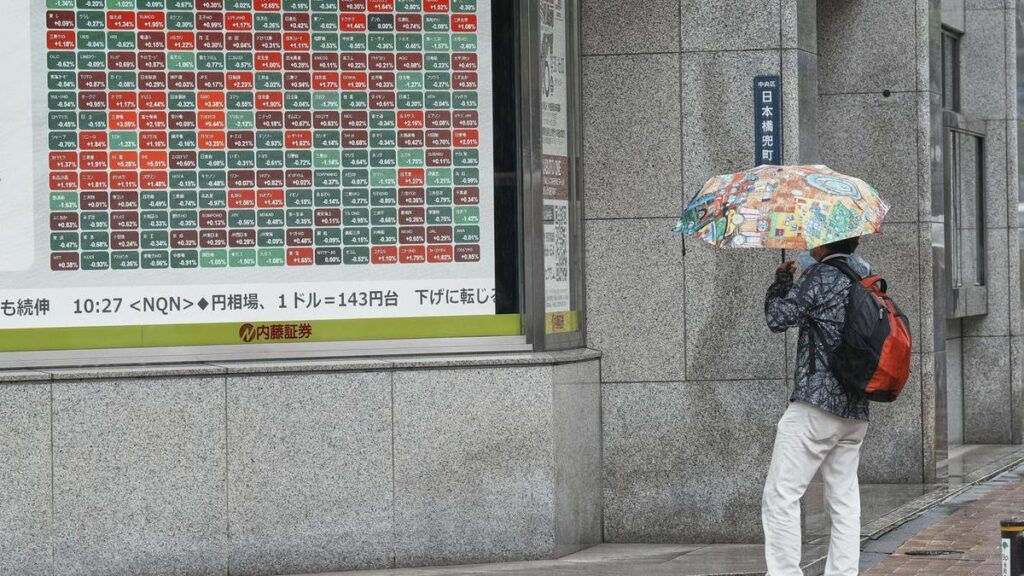Asian shares were subdued on Friday as investors hunkered down for the all-important payrolls report, while Tesla suffered huge losses on the very public feud between President Donald Trump and billionaire Elon Musk.
A run of soft economic data this week has markets wary of a downside surprise in the monthly payrolls print due later in the day, which would add to fears of stagflation while piling pressure on the Federal Reserve to ease policy in a hurry.
Tesla shares bounced 0.8 per cent in after-hours trading after tumbling a whopping 14 per cent overnight to wipe off $US150 billion ($A230 billion) in market value. That came after Trump threatened to cut off government contracts to Elon Musk’s companies as the once close relationship turned into a bitter public feud.
Nasdaq futures were flat and S&P 500 futures inched up 0.1 per cent.
MSCI’s broadest index of Asia-Pacific shares outside Japan slipped 0.1 per cent on Friday but it is still set for a weekly rise of 2.2 per cent to hover just below an eight-month peak.
Japan’s Nikkei rose 0.3 per cent but is set for a weekly drop of 0.7 per cent.
South Korea’s KOSPI is closed for a holiday but was up 4.2 per cent this week to nearly 11-month tops as the newly elected President Lee Jae-myung planned an emergency package to boost the flagging economy. The won has also gained 2.0 per cent this week to an eight-month peak.
Chinese blue chips were flat and Hong Kong’s Hang Seng dropped 0.3 per cent as a call between Trump and Chinese President Xi Jinping offered little clarity to ease ongoing trade tensions.
“The US-China agreement to de-escalate tensions, and the recent phone call between Trump and Xi, shows both countries have an economic ‘pain threshold’,” said Luke Yeaman, chief economist at the Commonwealth Bank of Australia.
“This takes some severe downside scenarios off the table, but tensions will remain high and further bouts of escalation are likely…we see little prospect that a comprehensive US-China trade agreement will be settled by 14 August.”
Weaker-than-expected labour market data, including a 47 per cent year-on-year jump in Challenger layoffs and a significant downside surprise in ADP’s private payrolls, have dampened expectations for the payrolls report.
Forecasts are centred on a rise of 130,000 jobs in May, with the unemployment rate holding steady at 4.2 per cent.
Any unexpected weakness could bring the next US rate cut forward and trigger a huge rally in Treasuries. Futures imply scant chances of a rate cut until September, which is about 93 per cent priced in, with another move likely to come in December.
Yields on the benchmark ten-year Treasuries were flat at 4.3925 per cent, having risen 3 basis points overnight to bounce away from a one-month low.
“We expect payrolls to lose additional momentum in May, printing a below-consensus 110,000,” said analysts at TD Securities in a note to clients.
“Markets have recently been singularly focused on tariffs and deficits, with macro taking a back seat in recent weeks. Our forecast may not be sufficient to catalyse this revamped focus on macro, but we expect downside surprises to generate a larger market reaction.”
The dollar was flat against its major peers on Friday but was set for a weekly drop of 0.7 per cent on soft economic data.
The euro got some support and hit a six-week top of $US1.1495 ($A1.7640) overnight after the European Central Bank cut rates but signaled that it was nearing the end of its year-long policy easing cycle. Investors have given up on a move in July, with the final move mostly to come in December.
In commodities markets, oil prices were slightly lower but were headed for weekly gains on supply concerns. US crude futures slipped 0.1 per cent to $US65.29 ($A100.19) a barrel but was up 2.1 per cent for the week.
In precious metals, gold prices climbed 0.3 per cent to $US3,362 ($A5,159) an ounce. For the week, they are up 2.2 per cent.

